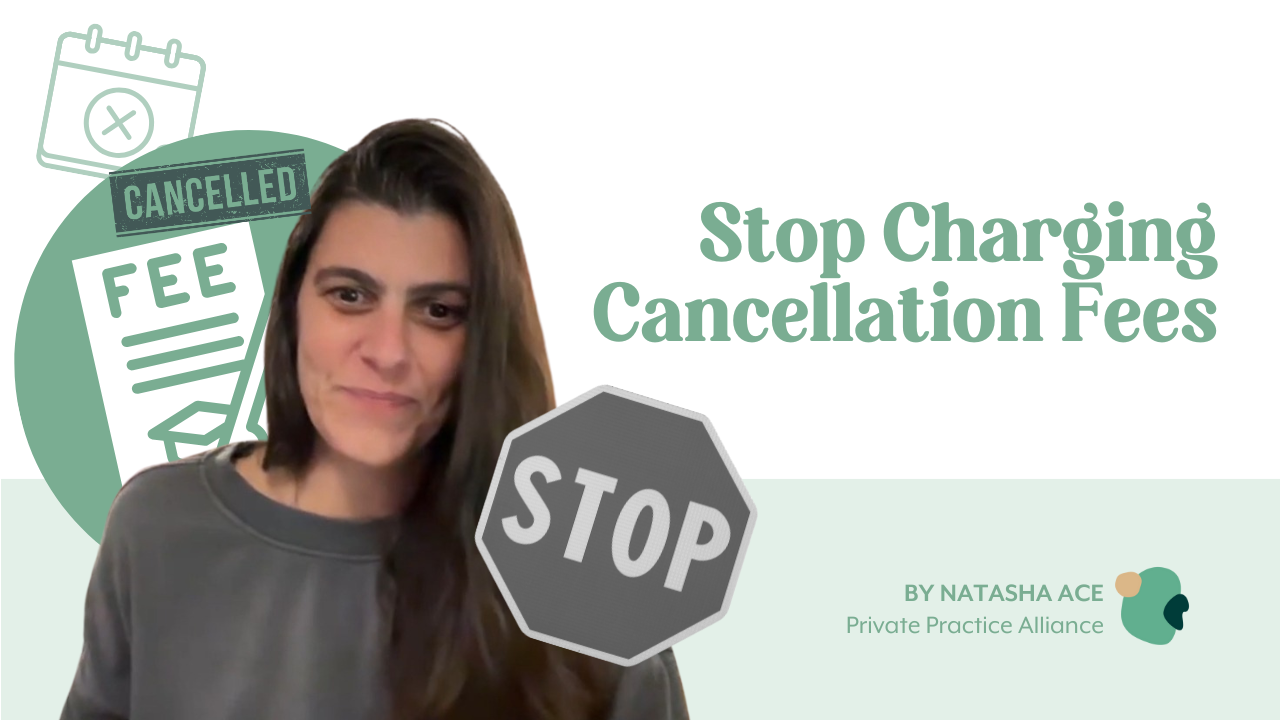Stop Charging Cancellation Fees

Want to Listen to this instead of reading it?
If not....read on ---->
Let’s be honest, talking about fees isn’t most practitioners’ favourite part of the job.
In allied health, it can feel awkward, procedural, even cold. And when it comes to cancellation fees? That awkwardness turns up to 11.
You don’t want clients to feel punished. They don’t want to feel penalised. But reschedules and cancellations don’t just cost money, they erode the therapeutic process itself. If we’re aiming for long-term change, consistency matters. That means showing up, even when life gets in the way.
A Quick Note: I’m Not a Clinician And That’s the Point
I’m Natasha Ace, founder of Private Practice Alliance. I’ve an MBA, not a therapist. My work is about helping health professionals translate the world of business into their clinical practices.
So, while I’m not trained to deliver therapy, I am trained to help you build a sustainable practice that protects your time, energy, and clinical outcomes. That starts with reframing your cancellation policy, not removing it.
Language Matters
When clients hear “cancellation fee,” they often hear “punishment.” It sets off shame, defensiveness, or worse - disengagement. The problem isn’t the policy. It’s the framing.
Instead, try calling it a Session Fee Policy.
- It’s about the commitment your client is making to their own process.
- The time slot is theirs whether they attend or not.
- They have options (telehealth, phone check-in), you’re not rigid; you’re resourceful.
- You’re not punishing anyone. You’re making it clear: change requires consistency.
This subtle shift in language moves the conversation from rules to responsibility and from obligation to agency.
But What If the Reason to Cancel Feels “Valid”?
Every client has reasons. Sick kids. Overlapping work. A headache. “I’m actually doing fine this week.” And yes, all of those reasons may feel valid.
But here's the reality: therapy only works if clients show up. Not every session will be a breakthrough. But every missed session is a missed opportunity. If your policy teaches people that showing up is optional, you’re inadvertently reinforcing the very behaviours that keep them stuck.
Instead, guide them toward consistency:
- Offer telehealth when they can’t physically attend.
- Adapt session plans when privacy is an issue.
- Encourage a quick check-in call if they’re overwhelmed.
It’s not about forcing them to show up, it’s about helping them see how they can show up, even when things aren’t ideal.
Why This Approach Improves Clinical Outcomes
You might be thinking: “That’s bullshit. The fee is only about the money”
Here’s the clinical-backed reality:
✅ Commitment = Progress
When there’s a real consequence to not attending, people treat therapy like the priority it is. The result? More consistent attendance. More momentum. Better outcomes.
✅ Boundaries Build Trust
Your time matters. So does your energy. By treating your work as valuable, you model the self-respect and accountability clients are often working toward themselves.
✅ Burnout Prevention
Late cancellations and constant reschedules mean you have to carry a larger caseload. A larger caseload means more emotional load. When your clients commit to the time slots they take, you get to bring your best to every client.
Compassion ≠ Waiving Boundaries
Let’s talk guilt. You might think, “They’re going through so much, I can’t charge them.” But if you waive your fee every time someone’s having a hard day, the cost lands on you. Not just financially, but emotionally.
- Someone pays for the room.
- You sit with the gap.
- You reinforce the idea that therapy is optional when life gets stressful.
That’s not compassion. That’s sacrifice. And it’s not sustainable.
You can absolutely make exceptions for genuine emergencies but that comes from a place of clarity, not guilt. The difference? One keeps your practice sustainable. The other burns you out.
Practical Strategies to Make It Stick
Here’s how to put this into practice without losing sleep over it:
📌 Talk About It Early
Introduce your Session Fee Policy at the intake call or first session. Be clear, not defensive. Frame it as part of the agreement: “You’re committing to this time for yourself and we’ll honour that together.”
📌 Use Supportive Scripts
Get comfortable with your language. Try:
“When you book this session, it’s yours to use however you need, whether it’s in person, over the phone, or on video. If you choose not to attend, the fee still applies.”
Practice it. Role-play with a colleague. Make it second nature.
📌 Offer Flexible Formats
No room? No excuse. Offer:
- Telehealth
- Phone check-ins
- Topic shifts (e.g. quick strategies vs deep processing)
Show them therapy isn’t about where you meet, it’s about showing up for themselves.
📌 Apply it Consistently
No more “just this once.” No “soft spots” for favourite clients. Consistency builds trust. It protects you and the therapeutic alliance.
📌 Frame It As Their Choice
If they cancel late, it’s not a mistake, it’s a decision. No shame. No lectures. Just follow-through: “The time was yours. The policy stands.”
Reflect Before You Resent
Still feeling unsure? Try this quick reflection:
- Write down the words “money,” “policy,” and “profit.”
- Note how they make you feel.
- Ask: Is this discomfort mine or inherited from systems that undervalue helping professions?
Now flip it:
- What if your policy empowers clients to prioritise themselves?
- What if protecting your time lets you be a better practitioner?
- What if this boundary is an act of care, not control?
Because it is.
You’re Not Just Setting Fees, You’re Setting Standards
This isn’t about “cracking down” on cancellations. It’s about creating a professional, therapeutic alliance that actually helps people change. It’s about reducing admin overwhelm. Avoiding burnout. And setting up a practice that supports you, so you can support others.
Want help implementing a Session Fee Policy that aligns with your values and voice?
Join us in our 5 Days to Fill Your Books coaching program where you get real strategies to protect your time, your caseload and your client journey.


